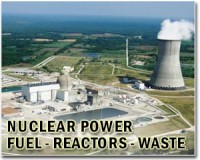 |
New Delhi (AFP) Aug 25, 2010 The Indian parliament adopted Wednesday a long-delayed law that will throw open the 150-billion-dollar Indian atomic energy market to foreign private nuclear groups. The law, which has been the subject of fierce wrangling between the government and opposition, is part of a 2008 landmark atomic energy pact with the United States that granted India access to foreign nuclear technology. Prime Minister Manmohan Singh told the lower house of parliament that the new law would end a three-decade "nuclear apartheid" that had prevented India from buying reactors and nuclear fuel from abroad. "It enables India to enter into nuclear commerce with other willing countries in order to widen its development options," Singh said during a lengthy debate that culminated with a verbal vote overwhelmingly in favour of the law. The legislation will now head to the upper house, where it is expected to pass without problem, and become law once the president has signed it. India had been denied access to civilian atomic technology and fuel since 1974 due to its nuclear weapons programme and refusal to sign the Nuclear Non-Proliferation Treaty (NPT), which New Delhi describes as discriminatory. Its isolation ended two years ago when former US president George W. Bush and Singh signed the atomic bill, granting India special rights to import civilian nuclear technology on condition it submit to inspections. Since then, French and Russian state-owned nuclear firms, whose liabilities are underwritten by their governments, have stolen a march on their US and Japanese competitors and have signed a slew of deals to build new plants in India. US group General Electric and Westinghouse Electric, a subsidiary of Japan's Toshiba Corp., have been reluctant to invest without a new legal framework specifying their liability in the event of an accident. The new law will provide them with clear rules, which is expected to result in major new contracts being signed, possibly during a visit by US President Barack Obama in November. The government had sought to build a national consensus on the law amid repeated objections from the main opposition, the Bharatiya Janata Party (BJP), which demanded stricter measures to hold foreign suppliers liable. Compared to a previous version of the draft law, the bill triples the compensation cap in the event of a nuclear accident to 15 billion rupees (322 million dollars). Ultimately, the BJP voted with the government, but several left-wing parties refused to give their assent. They and commentators have linked the passing of the legislation to Obama's visit, with the president set to press US business interests in the fast-growing South Asian market. "To say that this is being done to promote American interests, to help American corporations, I think is far from the truth," Singh said. In pushing for the bill to pass, the Indian government has emphasised the importance of nuclear technology to meet the growing energy needs of the country's fast-expanding economy and population. India expects nuclear power to supply 25 percent of its electricity by 2050. "Nuclear power is an option we should simply not ignore," Singh added, explaining that it was the most cost effective solution to increase electricity generation capacity. Almost 40 percent of Indian households are still without electricity. The US-India nuclear deal was as controversial as it was ground-breaking because of India's continued refusal to sign the NPT, which is an international treaty designed to limit the spread of nuclear weapons. Pakistan, India's neighbour and bitter rival, has pushed the US to grant it similar access to nuclear technology but without success. To India's and Washington's consternation, Pakistan's ally China is said to be interested in supplying more civilian nuclear technology to the country. Since the lifting of the nuclear trade embargo, India has signed civil nuclear cooperation agreements with the US, Russia, France, Britain and Canada, as well as Argentina, Kazakhstan, Mongolia and Namibia.
Share This Article With Planet Earth
Related Links Nuclear Power News - Nuclear Science, Nuclear Technology Powering The World in the 21st Century at Energy-Daily.com
 Russia backs African nuclear treaty
Russia backs African nuclear treatyMoscow (UPI) Aug 24, 2010 Even though Russia and the United States have the world's largest nuclear arsenals, Moscow is backing a nuclear initiative to ensure that Africa remains free of nuclear weapons. Russian President Dmitry Medvedev has submitted to the Duma for ratification two protocols to a treaty establishing Africa as a nuclear-free weapons zone, Itar-Tass reported. The protocols propose a ban o ... read more |
|
| The content herein, unless otherwise known to be public domain, are Copyright 1995-2010 - SpaceDaily. AFP and UPI Wire Stories are copyright Agence France-Presse and United Press International. ESA Portal Reports are copyright European Space Agency. All NASA sourced material is public domain. Additional copyrights may apply in whole or part to other bona fide parties. Advertising does not imply endorsement,agreement or approval of any opinions, statements or information provided by SpaceDaily on any Web page published or hosted by SpaceDaily. Privacy Statement |